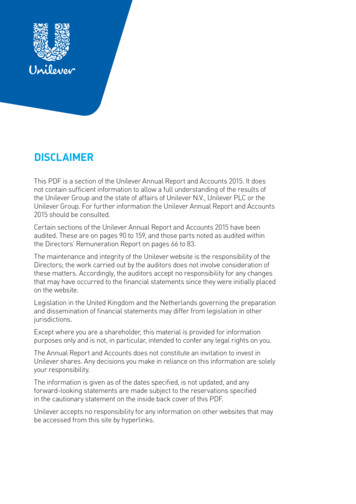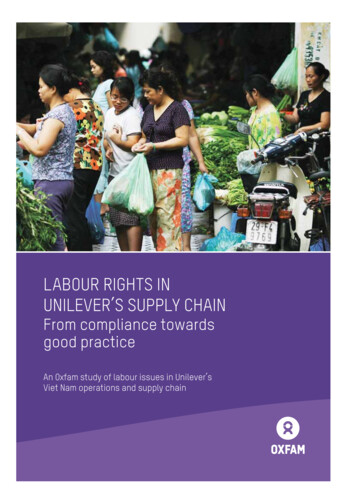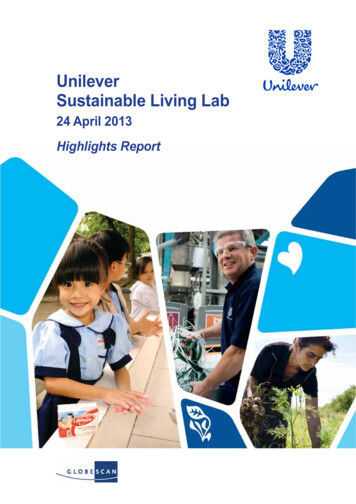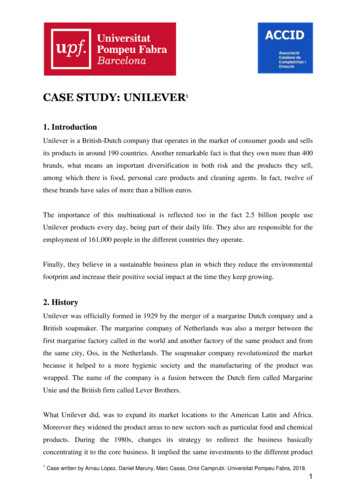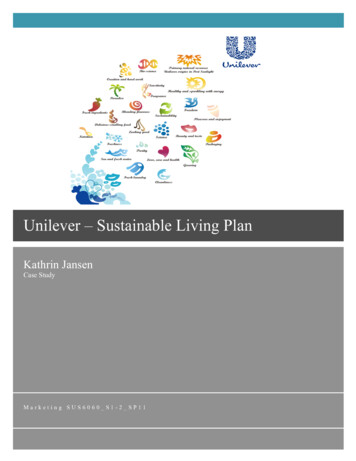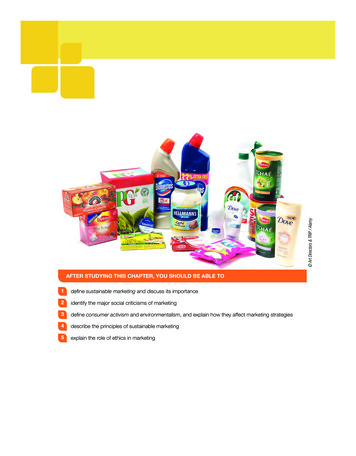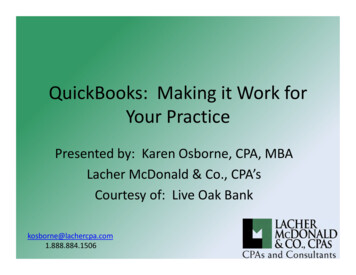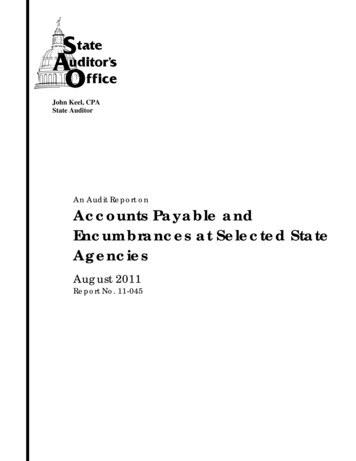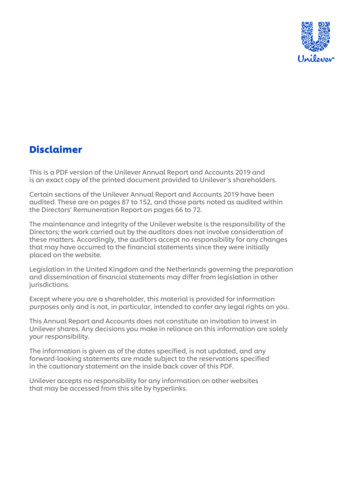
Transcription
DisclaimerThis is a PDF version of the Unilever Annual Report and Accounts 2019 andis an exact copy of the printed document provided to Unilever’s shareholders.Certain sections of the Unilever Annual Report and Accounts 2019 have beenaudited. These are on pages 87 to 152, and those parts noted as audited withinthe Directors’ Remuneration Report on pages 66 to 72.The maintenance and integrity of the Unilever website is the responsibility of theDirectors; the work carried out by the auditors does not involve consideration ofthese matters. Accordingly, the auditors accept no responsibility for any changesthat may have occurred to the financial statements since they were initiallyplaced on the website.Legislation in the United Kingdom and the Netherlands governing the preparationand dissemination of financial statements may differ from legislation in otherjurisdictions.Except where you are a shareholder, this material is provided for informationpurposes only and is not, in particular, intended to confer any legal rights on you.This Annual Report and Accounts does not constitute an invitation to invest inUnilever shares. Any decisions you make in reliance on this information are solelyyour responsibility.The information is given as of the dates specified, is not updated, and anyforward-looking statements are made subject to the reservations specifiedin the cautionary statement on the inside back cover of this PDF.Unilever accepts no responsibility for any information on other websitesthat may be accessed from this site by hyperlinks.
Purpose-led,future-fitUnilever Annual Reportand Accounts 2019
Unilever Annual Report andAccounts 2019This document is made up of the Strategic Report, the GovernanceReport, the Financial Statements and Notes, and AdditionalInformation for US Listing Purposes.In this reportStrategic ReportHow our strategy is delivering value for our stakeholdersAt a glance2Chairman's introduction4Our Board of Directors5Our Strategic Report, pages 1 to 46, contains information about us,how we create value and how we run our business. It includes ourstrategy, business model, market outlook and key performanceindicators, as well as our approach to sustainability and risk. TheStrategic Report is only part of the Annual Report and Accounts 2019.The Strategic Report has been approved by the Boards and signedon their behalf by Ritva Sotamaa – Group Secretary.Chief Executive Officer's Q&A6Unilever Leadership Executive7Our Governance Report, pages 47 to 77 contains detailed corporategovernance information, our Committee reports and how weremunerate our Directors.Our value creation modelThe Unilever Group consists of Unilever N.V. (NV) and Unilever PLC(PLC) together with the companies they control. The terms “Unilever”,the “Group”, “we”, “our” and “us” refer to the Unilever Group.Our Financial Statements and Notes are on pages 78 to 142.Pages 1 to 162 constitute the Unilever Annual Report and Accounts2019 for UK and Dutch purposes, which we may also refer to as‘this Annual Report and Accounts’ throughout this document.The Directors’ Report of PLC on pages 47 to 59, 78 (Statement ofDirectors’ responsibilities), 108 (Dividends on ordinary capital), 121to 127 (Treasury Risk Management), 148 and 152 (Post balance sheetevents) and 160 (Branch disclosure) has been approved by the PLCBoard and signed on its behalf by Ritva Sotamaa – Group Secretary.The Strategic Report, together with the Governance Report,constitutes the report of the Directors within the meaning of Article2:391 of the Dutch Civil Code and has been approved by the NV Boardand signed on its behalf by Ritva Sotamaa – Group Secretary.Pages 163 to 178 are included as Additional Information forUS Listing Purposes.OnlineYou can find more information about Unileveronline atwww.unilever.comFor further information on our sustainability activities andperformance visitwww.unilever.com/sustainable-livingThe Unilever Annual Report and Accounts 2019(and the Additional Information for US Listing Purposes)along with other relevant documents can be downloaded atwww.unilever.com/ara2019/downloadsOur strategyOur fast-changing world8Our strategy910Our stakeholdersStakeholder review:12– Consumers14– Our People16– Society18– Planet19– Customers20– Shareholders21Our performance22Financial review24Our risks33Non-financial information statement46Governance ReportHow we’re running a responsible and effective businessCorporate Governance47Report of the Audit Committee54Report of the Corporate Responsibility Committee56Report of the Nominating and Corporate GovernanceCommittee58Directors’ Remuneration report60Financial StatementsOur full financial results and notes for the yearStatement of directors’ responsibilities78Independent auditors’ reports79Financial statements87Notes to the consolidated financial statements91Unilever N.V. company accounts and notes143Unilever PLC company accounts and notes148Group companies153Shareholder information161Index162Additional information for US listing purposes163
Purpose-driven performanceOne in three people around the world use our brands everyday. With this reach comes responsibility – and opportunity.That’s why we've made it our purpose to make sustainableliving commonplace. To help people live well within thelimits of the planet. This isn’t just something we say – itsteers our decisions and shapes our actions, at every level ofthe business.Our focus on purpose goes back to the days of one of ourfounders, William Lever, well over 100 years ago. It’s partof Unilever history, and it’s integral to our future. This iswhy we want all our brands to take a stand, and act, on thebig social and environmental issues facing the world. Webelieve we’ll be a better and more successful business byfollowing this path.To truly make sustainable living commonplace, we have tobe fit for the future. This means anticipating the significantchanges which are shaping our industry. Becoming fullydigitised, lower cost, faster acting and more agile. Using ourscale and influence to create positive change well beyondUnilever. Expanding into high-growth markets with superiorproducts that are good for both people and the planet. Andcontinuing to attract the very best people into a diverse,inclusive and flexible working culture.Purpose-led, future-fit
At a glanceAs one of the world’s largest and oldest consumer goods businesses, we’re on a mission tomake sustainable living commonplace.A truly global businessStrong brands with purposeOur brands are available in over 190 countries.Our 400 household brands help people feel good,look good and get more out of life.2.5billionof brandswith purposepeople use ourproducts every day60%of turnover inemerging markets25millionretail salesoutlets in ourdistribution chain13 of thetop 50FMCG brands*with turnover of morethan 1 billion in the year84%of brands in top 1 or 2market positionsRead more about our brands and consumers on pages 14 to 15.Using our scale for goodPowered by our peopleWe have ambitious time-bound sustainabilitygoals which are delivering significant impact.Our purposeful and inclusive culture attractsand keeps the very best.1.3billionpeople helped toimprove their healthand hygiene since 201062%51/49150thousandemployeesof agriculturalraw materialssustainably sourced100%renewable gridelectricity in5 continentsRead more about society and the planet on pages 18 to 19.212brandsA growingportfolioUnilever Annual Report and Accounts 201990%of our leadersare localgender balancein management(female/male)**Number 1FMCG graduateemployer of choicein 52 marketsRead more about our people on pages 16 to 17.* Based on market penetration and consumer interactions (Kantar BrandFootprint report).** Based on a total management population of 15,028 Unilever employees.
Strategic ReportFinancial highlightsWhat we stand for:Making sustainable living commonplace.What we offer:Beauty & Personal Care, Foods & Refreshment,Home CareRead more about our brands and consumers on pages 14 to 15. 52.0 billionturnover 6.1 billionfree cash flow* 4.2 billiondividends paid19.1%underlying operating margin*16.8%operating marginBeauty & Personal CareWhat we stand for:Beauty that cares for people, society and our planet.Our largest categories:Deodorants, Haircare, Skin care, Skin cleansingA selection of our brands:Axe, Clear, Dove, Lifebuoy, Lux, Pond's, Rexona,Signal, Suave, Sunsilk, TRESemmé, Vaseline 21.9 billion turnover42% of total turnover52% of total operating profitFoods & RefreshmentWhat we stand for:Taste good. Feel good. Force for good.Our largest categories:Ice cream, Savoury, Dressings, TeaA selection of our brands:Ben & Jerry’s, Breyers, Brooke Bond, Heart (Wall’s),Hellmann’s, Knorr, Lipton, Magnum, Pukka,Sir Kensington’s, Unilever Food Solutions 19.3 billion turnover37% of total turnover32% of total operating profitHome CareWhat we stand for:Making your home a better world.Making our world a better home.Our largest categories:Fabric solutions, Home and hygieneA selection of our brands:Cif, Dirt is Good (Omo, Persil), Domestos, SeventhGeneration, Sunlight 10.8 billion turnover21% of total turnover16% of total operating profitRead more about our Divisions on pages 14 to 15.* Free cash flow and underlying operating margin are non-GAAP measures. For further information about these measures, and the reasons why we believe they areimportant for an understanding of the performance of the business, please refer to our commentary on non-GAAP measures on page 27.Unilever Annual Report and Accounts 20193
Chairman's introductionOur new Chairman reflects on a year of positive value creation, changes to the Board and thesteps being taken to accelerate growth in 2020 and beyond.Sadly, on 31 August 2019, Mary Ma, one of ourNon-Executive Directors, passed away aftera short illness. Mary was a highly committedand capable Director who put her expertiseand experience at the service of Unilever and isgreatly missed.RemunerationNils AndersenChairmanHaving served on the Board for five years, I amalready well aware of Unilever’s reputation asa purpose-driven company, one founded onstrong values, wonderful brands and a talentedand committed workforce. It was an honourtherefore to have been asked to become yourChairman in November 2019 and since then Ihave continued to work with the Board and theUnilever Leadership team to support the Group'sambitions. On behalf of the Board, I wouldlike to thank my predecessor, Marijn Dekkers,for his strong leadership as Chairman and forhis support in helping to ensure a seamlesstransition.2019 PerformanceUnilever delivered another year of positivevalue creation in 2019, driven by a continuingbalance of underlying sales growth, improvedprofitability and strong cash generation.Underlying sales growth fell slightly short ofthe company’s targeted range of 3-5%, whichwhile disappointing, could be explained in partby a significant slowdown in some of Unilever’shigh-growth markets. Some of these economicheadwinds will continue throughout 2020, butclear plans are in place – which the Board hasreviewed – to accelerate the rate of Unilever’sgrowth in 2020 and beyond.Board composition and successionThe Board appointed Alan Jope to the roleof CEO on 1 January 2019 and Alan was dulyelected as an Executive Director at the 2019AGMs. The Board fully endorses the strategyAlan has set out to ensure that Unilever ispurpose-led and future-fit, a strategy that atits heart believes sustainable business drivessuperior performance, creating long-term valuefor our stakeholders.During 2019 we continued to consult withshareholders on our Remuneration Policy,particularly for the Executive Directors, andset in motion the consultation process forimplementing our Remuneration Policy in 2020.With the aim of maintaining the high levels ofsupport from shareholders at the 2019 AGMs forthe implementation of our Remuneration Policy,we continued constructive engagement withboth our investors and proxy voting agencies onhow we intend to evolve the implementation ofour Directors’ Remuneration Policy.Corporate GovernanceRecent revisions of Corporate Governance Codesapplicable to Unilever expanded on the longstanding requirements for directors to remainmindful of the duties they have to consider themany stakeholders who have an interest in ourbusiness.A particular stakeholder focus for the Boardduring the year was our workforce. As a result,NEDs conducted a number of workforceengagement events to assess employeesentiment. Four face-to-face events wereheld in Brazil and the UK, allowing for opendiscussions on issues important to our people.The Board believes that an open, authenticand agile culture at all levels of Unilever fuelspersonal and business growth. The Board willtherefore continuously monitor the culturewithin the organisation, whether duringBoard visits, through workforce engagementsor by continuing to engage regularly withthe Unilever Leadership Executive and otherUnilever managers. Further information on ourengagement with Unilever’s employees can befound on page 48.In 2019, we took further steps in ourcommitment to be at the forefront of goodgovernance by cancelling the NV preferenceshares. We also initiated the termination of thedepositary receipt structure for the NV ordinaryshares which took effect on 28 June 2019.I was delighted that you also elected SusanKilsby as a Non-Executive Director at the 2019AGMs in May, with her appointment takingeffect on 1 August 2019. Susan has extensiveBoard experience as a non-executive in globalconsumer goods, financial and pharmaceuticalsectors, and possesses deep internationalbanking, financial and M&A experience.4Unilever Annual Report and Accounts 2019EvaluationOur Board evaluation in 2019 was externallyfacilitated and the results were discussed atthe January 2020 Board meeting. The Boardcontinues to operate in an effective manneroverall, and reflecting on the lessons learnt bythe Board in the previous year the Board agreed,in particular, in the evaluation discussionsto maintain strong focus on organic growth,portfolio evolution, leadership talent, andorganisation.Each Board Committee also performed its ownself-evaluation, agreeing areas where it couldenhance its effectiveness further. These aredescribed within each Committee Report.Looking aheadThe Board fully supports the strategy Unilever isfollowing, including the strategic review of thetea business, and is confident that everythingpossible is being done to help accelerate topline growth in 2020. The Board’s confidencealso derives from the high calibre of Unilever’smanagement. We look forward to working withAlan Jope and his team in helping to ensureUnilever remains a long-term, sustainablegrowth company.During its various visits last year to Unilever’soperations, including in Brazil and the UnitedStates, the Board was able to witness first-handthe passion and commitment of Unilever’shard-working employees. On behalf of theBoard, I want to thank all of the 150,000employees of Unilever for their efforts in 2019,and also acknowledge our appreciation for thecontinuing support of the Group’s shareholders.
Strategic ReportOur Board of DirectorsOur Non-Executive Directors bring diverse experience to the Board's strategic discussions anddecision-making.Youngme MoonLaura ChaVittorio ColaoMarijn DekkersJudith HartmannAndrea JungSusan KilsbyStrive MasiyiwaJohn RishtonVice-Chair and Senior Independent DirectorNon-Executive DirectorNon-Executive DirectorNon-Executive DirectorNon-Executive DirectorNon-Executive DirectorNon-Executive DirectorNon-Executive DirectorNon-Executive DirectorOur fellow Board member Mary Ma passed awayunexpectedly on 31 August 2019. Mary joinedUnilever in 2013 and served as a Non-ExecutiveDirector. She contributed strongly to the Board,serving as a member of the Audit Committee andmore recently, the Compensation Committee.We will remember Mary as a wonderful friendand will miss her warmth of character andkindness of spirit. She was a highly capableand committed Director who put her expertiseand distinguished experience at the service ofUnilever for many years.Feike SijbesmaNon-Executive DirectorMary Ma1952 – 2019Unilever Annual Report and Accounts 20195
Chief Executive Officer's Q&AAlan Jope answers questions on our performance in 2019, our Compass strategy, and otherhighlights and challenges of the year.Alan JopeChief Executive OfficerHow do you see the current stateof the world and the impact onUnilever’s markets?There’s no doubt that conditions are challengingright now. Sluggish economies and a highdegree of geopolitical uncertainty are inevitablyimpacting consumer confidence and spending,which in turn is intensifying competition inthe retail sector. However, Unilever has nowbeen around for 90 years and so we are veryaccustomed to operating through downturnsand periods of uncertainty like this, and indeedemerging stronger. Moreover, all our competitors– big and small – face the same challenges.The key in this environment is to remain relevantto the consumers you serve. For us, that comesdown to two things. First, earning trust byoperating a responsible, multi-stakeholderbusiness model. And second, harnessingadvances in science and technology – andespecially digital – in ways that allow us to reachand delight consumers in new and ever moreinventive ways. We are firmly focused on both.The recent outbreak of Coronavirus (COVID-19)is clearly concerning and we are monitoringdevelopments very closely. The safety and wellbeing of our people has been the overridingpriority. We are also doing all we can to ensurebusiness continuity and our teams are workingtirelessly to help mitigate the risks. Inevitably,however, there will be an adverse impact on thebusiness although the extent is not yet clear.As you look back, how do you reflecton Unilever’s business performancein 2019?It was a mixed performance. Our profitabilitywas good with a healthy improvement inunderlying operating margin, strong free cashflow delivery of more than 6.1 billion andcash flow from operating activities of 10.6billion. This is important because our modelis predicated on being able to re-invest in thelong-term health of the business, while alsopaying out a competitive annual dividend.On the flip side, growth is also a key driver ofvalue creation and our underlying sales growthperformance fell slightly short of expectations, at2.9%, which was naturally disappointing. Turnoverincreased 2.0% to 52.0 billion. While growthwas hindered by a marked slowdown in some ofUnilever’s high growth markets like South Asiaand West Africa, these markets all remain veryattractive long-term prospects for us. We are6confident therefore of restoring underlying salesgrowth to Unilever’s 3-5% multi-year range.What steps are you taking toaccelerate growth?What were the highlights for youof 2019?We’re doing a lot. I’ve already mentioned speed.There are two other areas I would highlight.First, we are putting a heightened level of focusaround some proven growth fundamentals,which we are confident will accelerate our topline performance. These include making ourinnovations even more impactful; building ourpresence in faster-growing retail channels, likee-commerce; ensuring that more and more ofour brands have a clearly articulated purposethat resonate with consumers; and driving oursavings programmes further to help fuel themany growth opportunities we have.A strong performance in the emerging markets– growing at over 5% – was an undoubtedhighlight. We also grew across each of our threeglobal Divisions, which was encouraging andreflects the inherent strengths of our brandsand our portfolio. Our Home Care Division had aparticularly strong year, growing by more than6%, driven by some great innovations and anintensifying focus around ‘green cleaning’. Theperformance of our recently acquired prestigebeauty brands – which grew double-digit – wasalso a highlight, further establishing Unilever asan important player in this highly attractive andfast-growing segment of the market.We have set out some very ambitious goals forUnilever. We want, for example, to be a globalleader in sustainability; to be the world’s bestmarketing company; and to be an organisationthat stands as a beacon for diversity andinclusion. Seeing Unilever recognised in 2019,therefore, as a leader in multiple externalbenchmarks, including the GlobeScanSustainability Leaders Survey (for the ninthconsecutive year); the World’s Most EffectiveMarketing Company; and as recipient of theprestigious Catalyst Award (for the companywhich has done most to accelerate the progressof women through workplace inclusion), were allspecial moments – as well as a spur to increaseour efforts still further in these important areas.Where do you feel the companycould have done better?In markets as dynamic and fast-moving as ours,speed is essential, both in seizing opportunitiesto meet changing consumer preferences butalso in responding when our business is undercompetitive challenge. While we do this wellon many occasions and in many parts of theworld, we haven’t yet developed the consistencyof response that I am looking for everywhere,and this was apparent in 2019. We made someimportant organisational changes during theyear – including flattening our market structureunder a newly created Chief Operating Officerposition – which I am confident will help to makeUnilever a faster and even more operationallyeffective business.As far as our global Divisions are concerned,while it was an excellent year as mentioned forHome Care, our Beauty & Personal Care andFoods & Refreshment Divisions both fell short ofexpectation – with underlying sales growth at2.6% and 1.5% respectively – and so this is wherewe will be looking to accelerate growth mostspecifically in 2020.In the area of diversity, we reached animportant milestone in 2019 on our journey tobecome a gender-balanced organisation. Ourmanagement population is now made up of justover 50% women. Pleasing as this is, the overallfigure masks the fact we haven’t yet made theprogress we want at the most senior levels ofthe company, where women are still underrepresented. This is very much a job half-donetherefore and something I intend to make apersonal priority in 2020.Unilever Annual Report and Accounts 2019The second relates to our portfolio. We havemade significant changes over recent years,acquiring businesses in new parts of the marketand disposing of businesses such as Spreads.The overall effect has been to improve Unilever’sexposure to faster growing markets, thosethat offer better long-term prospects for valuecreation. We will continue that process, evaluatingour portfolio rigorously against a range ofexacting criteria. It is in that context that we haveannounced a strategic review of our global teabusiness, which has a large footprint in the slowergrowing black tea segment and a history of beingdilutive to Unilever’s overall growth and margin.We will explore all options, with an open mind andwith the intention of sharing the conclusions of thereview by the middle of 2020.How are you planning to take forwardUnilever’s commitment to social andenvironmental sustainability?Under the Unilever Sustainable Living Plan (USLP)we have developed an enviable reputation forleadership on these issues. We now mean to buildon that, not least because many of the challengesthe world faces – like the climate crisis or growinginequality – are becoming ever more pressing.We will do this by embedding sustainability ina new purpose-led, future-fit Unilever Compassstrategy, and in two principal ways. First, we willcontinue to use our size and scale to help drivechange through our extended value chain. A greatexample last year was the ambitious commitmentwe made to address the issue of plastic packagingby halving our use of virgin plastic and by helpingto collect and process more plastic packagingthan we sell, both by 2025.Second, we will make our product brands evenmore prominent vehicles for driving social andenvironmental change. Many of our brandsalready do this, to great effect, but we now intendto make it an integral feature of every brand.We know that it works and that it also helps todrive growth. Last year, our most purposefulbrands grew faster than the rest of the portfolio.Unilever’s brands touch the lives of two and ahalf billion people every day so the opportunityfor us to influence behaviour and drive positivechange is enormous.I am very proud of all the women and men ofUnilever – and the millions more we partner withthroughout the value chain – who work so hardevery day to bring these commitments to life andwho are determined to show that Unilever canremain a force for good in the world.
Strategic ReportUnilever Leadership Executive (ULE)Our executive management team is responsible for the day-to-day running of the business andthe execution of our strategy, making sure we're purpose-led and future-fit.Graeme PitkethlyConny BraamsMarc EngelHanneke FaberFabian GarciaSunny JainPeter Ter KulveSanjiv MehtaLeena NairNitin ParanjpeRichard SlaterRitva SotamaaChief Financial OfficerPresident, Foods & RefreshmentPresident, Home CareChief Operating OfficerChief Digital and Marketing OfficerPresident, North AmericaPresident, South AsiaChief R&D OfficerChief Supply Chain OfficerPresident, Beauty & Personal CareChief HR OfficerChief Legal Officer & Group SecretaryUnilever Annual Report and Accounts 20197
Our fast-changing worldWe operate in a complex and volatile world. Our strategy is constantly evolving to adapt to thetrends and forces shaping our markets and impacting our stakeholders.Overview of our industryAs a leading global consumer goods company, we’re part of one of the world’s largest, most competitive and fast-moving industries. Yet, theseare volatile and uncertain times. According to the World Bank, global growth decelerated markedly in 2019, with continued weakness in globaltrade and investment affecting both developed and developing and emerging economies. Geopolitical tensions and climate concerns areincreasing the uncertainty. Conditions like these create challenges for companies and brands of all types.Amongst the economic uncertainty, new technologies are changing the landscape of the consumer goods market, bringing opportunitiesto brands and consumers alike. Consumers are shopping through more diverse channels and smaller local brands are increasingly meetingshoppers’ needs.As the global economy and the channel landscape evolve, we must be agile and responsive to capitalise on the opportunities. And by stayingclose to consumers and their needs we can ensure our business continues to grow, while having a positive impact on people and the planet.The key trends affecting our stakeholders and our markets are outlined below.Environment and society under stressDigital and technology revolutionWe’re in the midst of an environmental crisis. Our planet isheating, species are dying out at an unprecedented rate, andour rivers and oceans are filling with plastic. Global heating isplacing an increasing strain on food, water and other resources– and rising migration is expected to put new pressures oncities, people, societies and governments.Technology continues to change the fabric of life and business.Enhanced AI, robotics and the internet of things (IoT) arereshaping how people live, work and interact with the world– and with brands. Intelligent technologies are optimisingmanufacturing and agriculture, connecting global businesseslike ours inside and out, and changing how people shop.As both younger and older generations call for businesses andpoliticians to do more, only international co-operation andbold action from businesses and brands will start to createthe systemic change needed to protect our planet. The cost ofinaction far outweighs the cost of action.Digital channels bring opportunities for more targetedmarketing, deeper engagement and stronger connectionsbetween brands and consumers all over the world. Yet, withaccess to richer data and more intelligent analytics come risksand concerns around data security and privacy – businessesneed to collect and use data in responsible ways.Related principal risks: Climate change, Plastic packaging,Ethical (pages 36 and 39)For more on our response see pages 18 to 19.For more on our response see page 15.Living differentlyThe future of workSocieties are becoming more diverse and fragmented. We’reseeing, for example, growing splits between generations,socio-economic groups and political affiliations. As peopleincreasingly interact with each other and with businessesonline, consumers are making more decisions based on theirvalues. They’re also using both on- and offline channels to findbetter, more personalised products and services more easilyand quickly.The pace of change is affecting not only how people live,but how they work. Businesses of all types are becomingless hierarchical, more automated and more digital. As newroles and ways of working emerge, people increasingly needdifferent skills – and they’re also demanding more flexibilityfrom employers.In this new digital media and retail landscape, brands have to bevisible, convenient and part of the conversation – taking a standand action on the issues people care about. The fragmentationof consumer expectations and retail channels creates bothchallenges and opportunities for companies like Unilever.Related principal risks: Brand preference, Economic andpolitical instability, Portfolio management (pages 35 and 38)For more on our response see pages 14 to 15.8Related principal risks: Business transformation, Supply chain,Customer, Systems and information (pages 36 to 38)Unilever Annual Report and Accounts 2019Companies that offer more varied types of employment cantherefore attract the best people, while being more agile. Butalongside flexibility, employees of all ages are increasinglylooking for a fair, inclu
Strong brands with purpose Our 400 household brands help people feel good, look good and get more out of life. A growing portfolio of brands with purpose 12 brands with turnover of more than 1 billion in the year 13 of the top 50 FMCG brands* 84 % of brands in top 1 or 2 market positions Read more about our brands and consumers on pages 14 .
